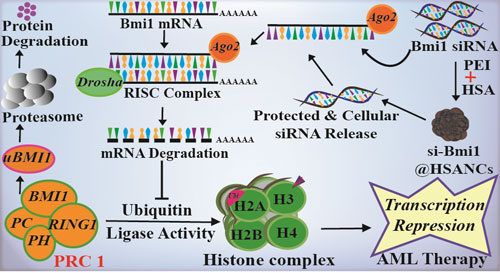 Scientists at the Institute of Nano Science and Technology (INST), Mohali, an autonomous institute under the Department of Science and Technology, Govt. of India, have recently synthesized a novel nanocarrier that can regulate gene expression of Acute Myeloid Leukemia (AML) and retard its progress.
Scientists at the Institute of Nano Science and Technology (INST), Mohali, an autonomous institute under the Department of Science and Technology, Govt. of India, have recently synthesized a novel nanocarrier that can regulate gene expression of Acute Myeloid Leukemia (AML) and retard its progress.Dr. Subhasree Roy Choudhury and her group from INST, Mohali have synthesized the nanocarrier that was made up of human serum albumin modified with Polyethylenimine (PEI) and entrapped with Bmi1 siRNA. This was used to control epigenetic regulator polycomb protein Bmi1 targeted AML nanotherapy.
The synthesized nanocarrier enhanced efficiency of introducing purified nucleic acids into eukaryotic cells in vitro. They also exhibited selective toxicity toward AML cell lines through the higher intracellular internalization of nanocarrier by pathway technically called caveolae mediated endocytosis.
The research work published in the journal ACS Applied Materials and Interfaces, 2020 by American Chemical Society shows that epigenetic controlling of polycomb, a family of protein complexes that can remodel chromatin such that epigenetic silencing of genes takes place. This can help nano therapeutic intervention for preventing the progress of AML.
siRNAs have gained attention as a promising tool to specifically cripple the molecular abnormalities through the RNA interference (RNAi) to silence the gene expression at transcriptional level. The complementary sequences of Bmi1 siRNA here specifically bound to target Bmi1 mRNA for its degradation.
Dr. Subhasree Roy Choudhury’s research group also explored the in vitro and in vivo downregulation of C-Myb, an oncogene overexpressed in AML and responsible for disease progression. They found that Bmi1 as a direct target of C-Myb in AML and inhibition of Bmi1 retards c-Myb mediated AML progression.
Furthermore, the group has established that Bmi1 inhibition in AML xenograft mouse model reduces the leukemic stem cell marker and increases myeloid differentiating marker expression in bone marrow resulting in recovery from AML morphology and showed superior therapy by present nanoformulation. Their study highlights transcriptional and epigenetic modulation-controlled cell death which facilitates antileukemic therapy.
“We are witnessing an extraordinary development of a variety of nano-carriers as theranostic platforms that combine diagnostic and therapeutic functions in a single system for a plethora of conditions including cancer. Such platforms also often allow early detection, targeted and sustained release of actives such as drugs and genes and possibility of personalized medicine,” said Prof Ashutosh Sharma, Secretary, DST.
The team is now exploring the role of other Polycomb Repressive complex 1 and 2 members involvement in AML onset, maintenance, progression and their nanotherapeutic regulation to impede AML pathogenesis (origination and development of disease).
The present research in epigenetic controlling of AML will open up new horizon for the identification of novel biomarkers for AML and help in development of targeted, functionalized nanotherapy for prevention of AML.
Reference: Epigenetic Regulation of Bmi1 by Ubiquitination and Proteasomal Degradation Inhibit Bcl2 in Acute Myeloid Leukemia: Avinash Chandra Kushwaha, Soni Jignesh Mohanbhai, Mohammed Nadim Sardoiwala, Ankur Sood, Surajit Karmakar and Subhasree Roy Choudhury, ACS Appl. Mater. Interfaces 2020, 12, 23, 25633–25644.
Publication link: DOI: https://dx.doi.org/10.1021/acsami.0c06186
For more details, Dr. Subhasree Roy Choudhury (subhasreerc[at]inst[dot]ac[dot]in) 0172-2210075 (ext. 214) can be contacted.






























